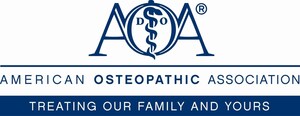CHICAGO, Aug. 9, 2017 /PRNewswire-USNewswire/ -- As students prepare to enter middle school and receive immunizations for tetanus, diphtheria and meningitis, osteopathic physicians encourage parents to also get them vaccinated for human papillomavirus virus (HPV), which causes cancers that develop later in life.
HPV vaccination rates currently stand at 63 percent in the United States, according to the Centers for Disease Control, which reports that 6 out of 10 girls, and only 5 out of 10 boys, have started the HPV vaccine series. The CDC recommends vaccinating preteen boys and girls at 11 or 12, when the vaccine produces a robust immune response, to protect them before HPV exposure occurs.
"HPV causes several kinds of cancer, and the HPV vaccine is 98 to 100 percent effective at preventing them," said Scott Cyrus, DO, an osteopathic pediatrician practicing in Tulsa. "Still some parents are leery of letting their child get it, but it's up to physicians to educate parents and advocate for preventative medicine."
Dr. Cyrus says the most common objection from parents is that their 11-year-old son or daughter isn't sexually active, so they don't need the vaccine. Others worry that getting vaccinated will send a message that the child has permission to become sexually active.
"I tell parents that a vaccine won't change their child's values but it can save their life. Also, I educate the child and explain that the vaccine does not protect against a number of other serious sexually transmitted infections, so it's not a license for consequence-free sex," said Dr. Cyrus.
He also reasons with parents that their children will eventually become sexually active and, at that point, it's too late get vaccinated. "Finally, I tell them I've had all five of my children vaccinated, which goes a long way to assure them of the vaccine's safety and efficacy."
Approximately 99 percent of cervical cancers are caused by high-risk HPV viruses that lead to abnormal cell changes, according to Octavia Cannon, DO, president-elect of the American College of Osteopathic Obstetricians and Gynecologists.
"The vaccine was an important step forward in women's health because of the irrefutable link between cervical cancer and the HPV virus. What we now understand is that it has the potential to be as important for preventing devastating cancers in men," Dr. Cannon explained. "Ten years of data have shown the vaccine to safe and well-tolerated, so as osteopathic physicians want our patient to take advantage of every opportunity to keep themselves healthy."
Every year, about 17,600 women and 9,300 men are affected by cancers caused by HPV. The HPV vaccine is given in a series of two or three shots over the course of six months. Teens and young adults who did not begin or complete the series should do so immediately, according to the CDC.
Since the vaccine was first recommended in 2006, there has been a 56% reduction in vaccine type HPV infections among teen girls in the U.S., even with very low HPV vaccination rates.
About the American Osteopathic Association
The American Osteopathic Association (AOA) represents more than 123,000 osteopathic physicians (DOs) and osteopathic medical students; promotes public health; encourages scientific research; serves as the primary certifying body for DOs; is the accrediting agency for osteopathic medical schools; and has federal authority to accredit hospitals and other health care facilities. To learn more, visit www.DoctorsThatDO.org.
SOURCE American Osteopathic Association
Related Links
WANT YOUR COMPANY'S NEWS FEATURED ON PRNEWSWIRE.COM?
Newsrooms &
Influencers
Digital Media
Outlets
Journalists
Opted In





Share this article